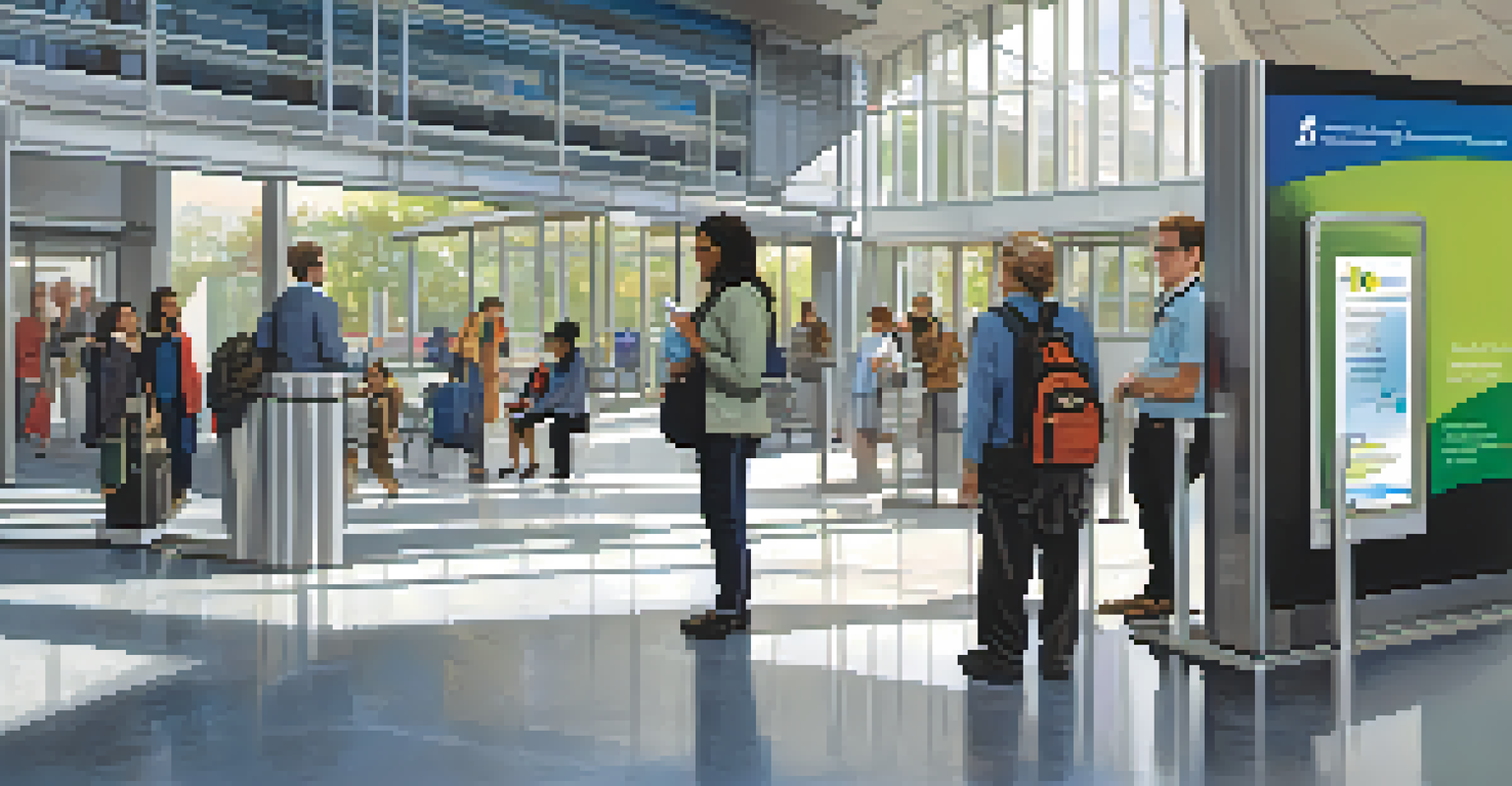The Importance of Public Transit Accessibility in Atlanta

Understanding Public Transit Accessibility in Atlanta
Public transit accessibility refers to the ease with which all individuals can access public transportation services. In Atlanta, this includes buses, trains, and other forms of mass transit that can accommodate people with disabilities or those needing extra assistance. The goal is to create a system where everyone, regardless of their physical abilities, can travel efficiently and independently.
Public transportation is a lifeline for many people. When we make it accessible, we open up a world of opportunities.
Accessibility involves more than just ramps and elevators; it encompasses a wide range of features, such as audible announcements, well-marked signage, and trained staff. These elements are crucial for ensuring that transit systems serve all members of the community. In a vibrant city like Atlanta, where mobility is key to participation in economic and social life, accessibility is essential.
Moreover, enhancing accessibility can lead to increased ridership. When people know they can rely on public transit without facing barriers, they are more likely to use it. This, in turn, contributes to a more sustainable urban environment by reducing traffic congestion and lowering carbon emissions.
The Economic Impact of Accessible Public Transit
Accessible public transit plays a significant role in driving economic growth. By connecting individuals to job opportunities, educational institutions, and essential services, it empowers communities and fosters economic participation. In Atlanta, where the job market is continually evolving, accessibility is more important than ever.

Furthermore, when public transit systems are inclusive, they attract a diverse population, including tourists and new residents. This influx can lead to increased spending in local businesses and enhanced economic development. For instance, neighborhoods near accessible transit stations often see higher property values, benefiting homeowners and investors alike.
Importance of Accessible Transit
Accessible public transit is essential for enabling all individuals, regardless of their physical abilities, to participate fully in their community and economy.
Investing in accessible transit is not just a moral imperative; it’s also a smart economic strategy. Cities that prioritize accessibility tend to experience long-term benefits, including a healthier workforce and reduced reliance on costly personal vehicles. As Atlanta continues to grow, prioritizing accessibility will be key to maintaining its economic vitality.
Social Equity and Public Transit Accessibility
Public transit accessibility is fundamentally tied to social equity. When transit systems are accessible, they enable all individuals, regardless of their socioeconomic status or physical ability, to participate fully in their community. In Atlanta, this means ensuring that marginalized groups have equal access to employment and educational resources.
Accessibility is not a privilege; it is a right. Every individual deserves the ability to navigate their community with ease.
Without accessible transit, many people may find themselves isolated or unable to reach vital services, such as healthcare or grocery stores. This lack of access can exacerbate existing inequalities and hinder community development. By making transit accessible, Atlanta can work towards a more equitable society.
Moreover, accessible public transit fosters community building by encouraging diverse groups to interact. When people from different backgrounds can travel freely, they share experiences and perspectives that enrich the community. This exchange is vital for creating a cohesive, vibrant city where everyone feels included.
Challenges to Achieving Transit Accessibility in Atlanta
Despite the clear benefits, achieving public transit accessibility in Atlanta is not without its challenges. Budget constraints often limit the extent of improvements that can be made to existing systems. As the city grows, prioritizing funding for accessibility enhancements can be a contentious issue among policymakers.
Another significant challenge is the aging infrastructure of many transit systems. Updating or retrofitting older vehicles and stations to meet modern accessibility standards requires time and resources. This can lead to delays in implementation, frustrating those who are dependent on accessible transit.
Economic Benefits of Accessibility
Investing in accessible public transit can drive economic growth by connecting people to job opportunities and increasing local business activity.
Additionally, there’s a need for ongoing training and awareness programs for transit personnel. Ensuring that staff understand the importance of accessibility and how to assist those with disabilities is crucial. Without this training, even well-designed systems can fall short of their potential to serve all riders effectively.
Innovative Solutions for Better Transit Accessibility
To overcome these challenges, innovative solutions must be explored. One such approach is the use of technology, such as mobile apps that provide real-time information about transit options and accessibility features. By leveraging technology, Atlanta can empower riders with the information they need to navigate the transit system confidently.
Another promising solution involves community engagement. By involving local residents, especially those with disabilities, in the planning process, transit authorities can gain valuable insights into their needs. This collaborative approach ensures that accessibility improvements are not only effective but also aligned with community expectations.
Furthermore, partnerships with local businesses and organizations can enhance accessibility initiatives. For example, businesses can offer discounts to transit users or support shuttle services for individuals with mobility challenges. These partnerships can create a more inclusive environment while also promoting a culture of accessibility across the city.
The Role of Advocacy in Promoting Transit Accessibility
Advocacy plays a vital role in promoting public transit accessibility in Atlanta. Grassroots organizations and community leaders often lead the charge, raising awareness about the importance of accessible transit. Their efforts bring attention to the needs of individuals with disabilities and help shape public policy.
Advocacy also involves educating the public about transit accessibility issues. By sharing stories of those impacted by a lack of accessible transit, advocates can foster empathy and support for necessary changes. This public engagement is crucial for building momentum behind accessibility initiatives.
Challenges in Transit Accessibility
Atlanta faces significant challenges in achieving public transit accessibility due to budget constraints, aging infrastructure, and the need for ongoing staff training.
Moreover, working with local government and transit authorities is essential for driving change. Advocates can help ensure that accessibility is prioritized in transit planning and funding decisions. This collaboration can lead to meaningful improvements in the lives of many Atlanta residents.
The Future of Public Transit Accessibility in Atlanta
Looking ahead, the future of public transit accessibility in Atlanta is promising but requires ongoing commitment. As the city expands, there will be more opportunities to incorporate accessible features into new transit projects. This proactive approach can set a standard for other cities to follow.
Additionally, as technology continues to advance, it offers new ways to enhance transit accessibility. From automated systems to improved communication tools, the potential for innovation is vast. Embracing these technologies can help create a more user-friendly transit experience for everyone.

Ultimately, the success of public transit accessibility in Atlanta will depend on collaboration among stakeholders, including government, transit authorities, and community members. By working together, they can ensure that accessibility remains a priority, making Atlanta a city that truly serves all its residents.